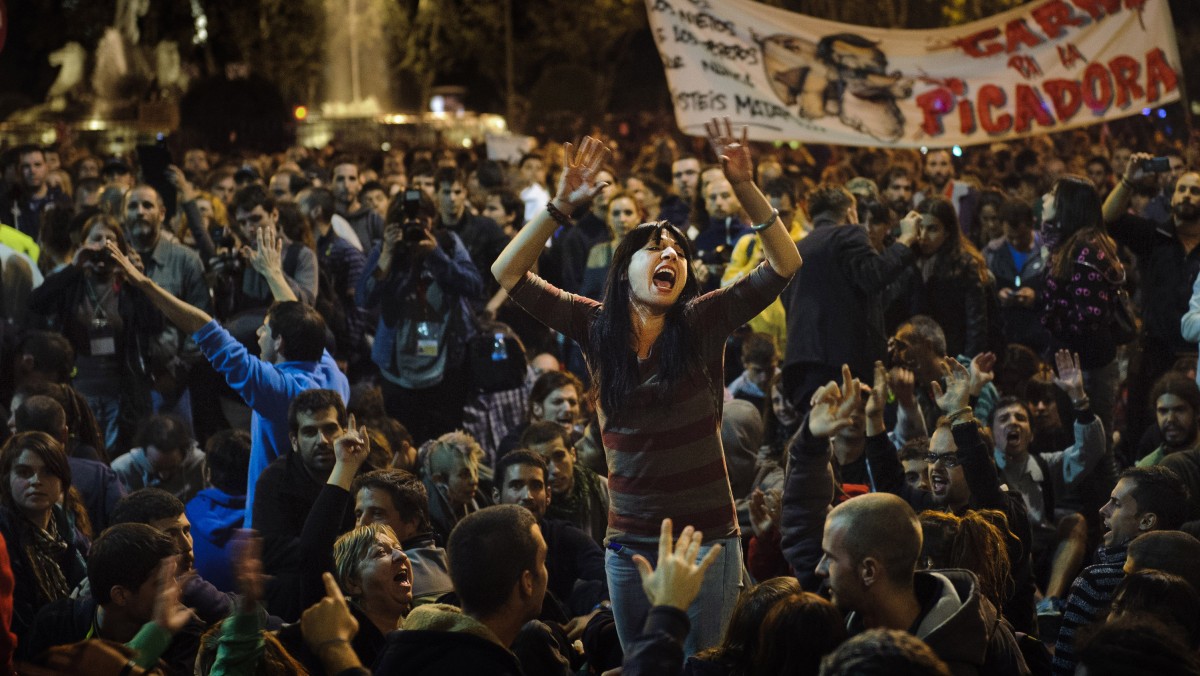
(NEW YORK) MintPress – There was one piece of positive news in an otherwise dismal week for governments embroiled in the European debt crisis after Spanish officials announced on Thursday they are set to pass 43 new laws to reform the economy within the next six months.
Deputy Prime Minister Soraya Saenz de Santamaria outlined a tough 2013 budget focused on spending cuts rather than tax rises as the country continues to negotiate a possible European aid package. Spain, Europe’s fourth largest economy, will also set up an independent fiscal authority to help oversee its deficit cutting promises, he added.
“If there’s a solution where Spain can lower their yields, then there’s a possibility Spain will find a way to pull themselves out of this mess. Stocks are popping on this, and so is gold,” said Mike Matousek, senior trader at U.S. Global Investors in San Antonio.
Still, the move comes amid growing social unrest throughout the Eurozone, many of whose 17 countries, faced with shaky public finances and a loss of investor confidence, have been forced to take painful restructuring steps, such as raising the retirement age and cutting worker salaries.
Economists elsewhere have often criticized the structure of the Euro system, because it has a common currency but no unified fiscal system, such as common taxes, pensions and treasury functions. And the latest crisis has triggered the ongoing debate about whether, and for how long, the European Union can last.
Writer and journalist Daniel Hannan, a Conservative Party Member of Parliament for South East England since 1999 who believes that the EU is making its constituent nations poorer, less democratic and less free, wrote in a recent article in Britain’s Telegraph newspaper that the “EU has lost whatever legitimacy it once enjoyed.
“It may stagger on for another five years, or even another ten,” he continued. “But, if the happy events of 1989 teach us anything, it’s that the end, when it comes, is more sudden than anyone had dared to hope.”
The year 1989, of course, was marked by revolutions which overthrew the Communist states in various Central and Eastern European countries.
Economic decline
This week, tens of thousands of protesters took to the streets of the Spanish capital Madrid and the Greek capital Athens this week to protest their countries’ austerity measures.
Unemployment in the region remains at a record high of 11.3 percent.
“For the past two to three years, we’ve been living an incredible social catastrophe,” one demonstrator in Greece told Agence France Presse. “My salary has been cut by 50 percent. I have two children and tomorrow I don’t know if I’ll have a job.”
Prospects for the future are indeed shaky, with the U.S. credit rating agency Standard & Poor’s slashing its forecasts for the Eurozone and warning that the region’s economy won’t start to grow until at least 2014.
In a new paper titled “New Recession in the Eurozone,” S&P says that the Eurozone’s GDP will shrink by 0.8 percent this year instead of the 0.7 percent previously estimated. And growth in 2013 is expected to be flat compared to the earlier forecast of up 0.3 percent.
“Recent economic indicators continue to paint a bleak picture for Europe. The data confirms our view that the region is entering a new period of recession after three quarters of negative or flat growth since the final quarter of 2010,” said Jean-Michel Six, S&P’s chief economist for Europe, the Middle East and Africa.
The agency was especially pessimistic about Spain, expecting its economy to shrink by at least 1.4 percent next year, more than double its earlier estimate of a 0.6 percent decline. S&P also affirmed Spain’s BBB+ debt rating, which is just two notches above so-called junk status.
Earlier this week, the head of the International Monetary Fund, Christine Lagarde, called on European leaders and the U.S. to take urgent action to stem the crisis.
“Uncertainty in the Eurozone remains the greatest risk to the global economy today,” she said in a speech at the Peterson Institute for International Economics in Washington, D.C.
Street rage
Public uprisings are also a huge threat to the region. Following a violent police crackdown on Tuesday, thousands of Spaniards, led by the co-called “indignados,” or outraged, returned to Madrid’s Plaza de Neptune near the Parliament building.
There was a tense standoff between the demonstrators and police, who had cordoned off the square, before the officers retreated and protesters poured in, cheering jubilantly.
There were later scattered reports of police brutality and violence.
The demonstrators called for new elections, claiming the proposed austerity measures prove the right-leaning Popular Party has lost its legitimacy.
A rally in Athens also turned violent when protesters lobbed Molotov cocktails at police, who responded by firing tear gas at the demonstrators.
An estimated 70,000 people gathered in front of the Parliament building for the country’s biggest anti-austerity protest since the coalition government led by the center-right New Democracy party came to power earlier this year.
As Europe sneezes, the U.S. braces for a cold
Meanwhile, the U.S. economy, still fragile and hampered by slow growth, is not immune to the Eurozone’s woes.
“The U.S. is tied into the global economy through interest rates, through trade, through exchange rates, through credit spreads, through bank borrowing costs, and so if Europe spirals downward, it will certainly impact us,” explained Richard H. Clarida, a professor of economics and international affairs at Columbia University in an interview with the Council on Foreign Relations.
Federal Reserve Bank of Philadelphia President Charles Plosser said during a recent appearance on Bloomberg TV that policy makers are closely monitoring debt crisis. “The Fed is watching Europe very carefully and the consequences of that, how that will play out if Europe suffers a financial crisis for some reason,” he acknowledged.
“We’re in uncharted territories, not just for monetary policy but for our economy and the kind of headwinds we’re facing,” said Plosser. “There’s plenty to keep you up at night.”


